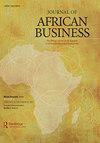外国公司在加纳的存在:金融、基础设施和制度约束的作用
IF 1.8
Q3 BUSINESS
引用次数: 1
摘要
摘要本研究采用企业层面调查数据的logit回归,考察了商业环境的各个方面对外国企业在加纳参与的影响。分析非矿业外国投资的主要制约因素,对于优先改革整体商业环境具有重要意义。此外,根据不同的企业特征评估影响的变化对政府制定旨在激励外国企业子类别的政策很重要。研究结果表明,金融因素(获得资金的途径)和制度因素(司法系统和土地获得途径)在限制外国投资的可能性方面最为重要。根据与外国所有权程度、公司规模和公司经营所在行业相关的公司特征,可以获得不同的效果。商业环境的影响也因公司的区域位置而异。本文章由计算机程序翻译,如有差异,请以英文原文为准。
The Presence of Foreign Firms in Ghana: The Role of Financial, Infrastructural and Institutional Constraints
ABSTRACT Using logit regression on firm-level survey data, this study examines the effects of various aspects of the business environment on foreign firm participation in Ghana. An analysis of the main constraints on non-mining foreign investment is important in terms of prioritizing reforms of the overall business environment. In addition, assessing the variation of effects according to different firm characteristics matters for government policy formulation aimed at incentivizing sub-categories of foreign firms. The findings suggest that financial factors (access to finance) and institutional factors (the judicial system and land access) are most important in constraining the probability of foreign investment. Distinct effects are obtained depending on firm characteristics relating to the degree of foreign ownership, the size of the firm and the industry in which the firm operates. The effects of the business environment also vary according to the firm’s regional location.
求助全文
通过发布文献求助,成功后即可免费获取论文全文。
去求助
来源期刊

Journal of African Business
BUSINESS-
CiteScore
4.60
自引率
10.50%
发文量
36
期刊介绍:
Journal of African Business is the official journal of the Academy of African Business and Development, the largest network of professionals committed to advancement of business development in African nations. JAB strives to comprehensively cover all business disciplines by publishing high quality analytical, conceptual, and empirical articles that demonstrate a substantial contribution to the broad domain of African business. Regardless of the research context, tradition, approach, or philosophy, manuscripts submitted to JAB must demonstrate that the topics investigated are important to the understanding of business practices and the advancement of business knowledge in or with Africa. Particularly, JAB welcomes qualitative and quantitative research papers. JAB is not, however, limited to African-based empirical studies. It searches for various contributions, including those based on countries outside Africa that address issues relevant to African business. Targeted toward academics, policymakers, consultants, and executives, JAB features the latest theoretical developments and cutting-edge research that challenge established beliefs and paradigms and offer alternative ways to cope with the endless change in the business world. Covered areas: Accounting; Agribusiness Management and Policy; Business Law; Economics and Development Policy; Entrepreneurship and Family Business; Finance; Global Business; Human Resource Management; Information and Communications Technology (ICT); Labor Relations; Marketing; Management Information Systems (MIS); Non-Profit Management; Operations and Supply Chain Management; Organizational Behavior and Theory; Organizational Development; Service Management; Small Business Management; Social Responsibility and Ethics; Strategic Management Policy; Technology and Innovation Management; Tourism and Hospitality Management; Transportation and Logistics
 求助内容:
求助内容: 应助结果提醒方式:
应助结果提醒方式:


